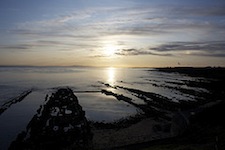IAN CAMPBELL

Ian Campbell
Biography
From the CD Booklet " The Times They Are A-Changin "
Ian ( born 10 June 1933 ) and Lorna, six years younger than her sibling, had initially been raised in Aberdeen before the fmily settled in Birmingham after the cessation of the Second World War. Raised in a household in which traditional folksong was the dominant musical backdrop, the pair formed the Clarion Skiffle Group in 1956 as the likes of Lonnie Donegan influenced an entire generation of putative musicians. Within a couple of years, however, the skiffle boom was over, and Ian and Lorna - who'd first sung in public when she'd won a cinema talent contest at the age of ten - realigned themselves slightly as the Ian Campbell Folk Four.
Alongside Ian and Lorna were Dave Phillips and Gordon McCulloch , though the latter was only briefly involved, and was replaced in 1959 by teenager John Dunkerley.
When another youngster, fiddle/mandolin player Dave Swarbrick, joined the following year, the name was changed to the Ian Campbell Folk Group, and it was under this moniker that they gradually built a reputation. On tuesday evenings they ran a folk club, the Jug o Punch, at The Crown public house in Station Street, Birmingham. Word quickly got round, and the venue quickly became established as one of the leading clubs of the British folk revival, primarily showcasing the Campbells but also providing an appreciative audience with such aspirant younger performers as Birmingham schoolteacher Harvey Andrews.
In 1962 the Ian Campbell Folk Group made recording history. Signing to Topic, at that stage the leading British folk label,they issued the eight-track EP Ceilidh At The Cavern, which became the first ever live folk club recording to gain a general release. It was followed by a second EP, Songs of Protest, as well as a 45rpm single release of an early Ian Campbell song, 'The Sun is Burning'. One of the most powerful political statements to emerge from the British folk scene,' The Sun is Burning ' made a widespread impact, adding greatly to the group's increasingly high-profile nature.
Releases
ACCOUNT
SHOPPING CART
You have no items in your order.
MAILING LIST
TOP SELLERS
- Órach
The Tannahill Weavers
CD: £12.15 - In Praise of Home
Rura
CD: £11.80 - Beyond
Talisk
CD: £10.29 - St. Kilda Wedding
Ossian
Download: £7.00 - Osgarra
Beinn Lee
CD: £11.80 - 100 Scottish Greats
Various Artists
4xCD: £9.40 - Sleeper
Kan
CD: £12.60 - Songs Of The Jacobites -Vol 2
Kenneth McKellar - Evo
Skerryvore
CD: £10.00 - Cavalier
Eddi Reader
CD: £10.00
YOUTUBE
We have a YouTube channel where you can watch some of the celtic music related videos we've found.www.youtube.com/allcelticmusic
Threads of Sound
The downloads on this site are provided by Threads of Sound. They also distribute music to iTunes, eMusic, Spotify and many others. If you want to sell your music on all celtic then you register it via Threads of Sound.www.threadsofsound.net

MASTHEAD
Our current header image was taken by Nick Bramhall and you can find the original here.Privacy Policy | Terms & Conditions | Contact Us
© Threads of Sound Music Services Limited. T/A All Celtic Music - Registered in Scotland no. 475134
